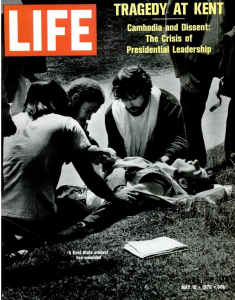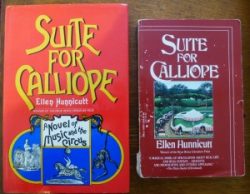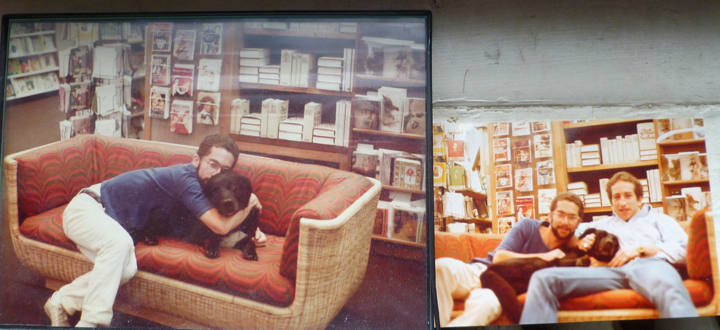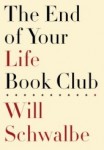May 4th, a Key Date in My Life at 3 Critical Junctures
 May 4, 2018—On this date forty years ago, I opened Undercover Books in Cleveland with my sister Pamela, brother Joel, and our parents Earl and Sylvia. Below is one of my favorite posts I’ve ever written and shared from this blog about this date in my life.
May 4, 2018—On this date forty years ago, I opened Undercover Books in Cleveland with my sister Pamela, brother Joel, and our parents Earl and Sylvia. Below is one of my favorite posts I’ve ever written and shared from this blog about this date in my life.
—–
I published a version of this post on May 4, 2012, and have now updated it for 2013-14 with additional material, such as Crosby, Stills, Nash & Young’s “Ohio,” as you’ll see below. The comments below are from the 2012-13 posting–you’re welcome to add your own.
—
May 4, a big date on my personal calendar
On this date in 1970 I was fifteen. That afternoon, around 4:30, I was standing on a sidewalk in downtown Cleveland, waiting for my sister Pamela to get off her job at Halle Bros., a local department store. Nearby, a delivery van pulled up, with the name of the evening paper, Cleveland Press, emblazoned across its side. The back door of the van rolled up and a worker began tossing bundles of that afternoon’s edition off the truck. It was a real “Front Page” moment, as in old movies when a swirl of numbered calendar pages and newspaper print resolves in to a splashy headline of bold, readable type and a brash reporter rushes off to get the rest of the story. Only this time, it was not a funny, Capraesque moment. In weirdly unfolding slow-motion I watched a particular bundle roll toward me until it landed above the fold, headline up. Like seeing a license plate in front of one’s eyes during a car accident—and remembering the combo of digits and letters forever—I read the inches-high black type: Four Students Shot Dead On Kent Campus. For several days prior, I had been following the antiwar demonstrations at Kent State, about thirty miles from Cleveland, and I knew that Ohio Governor James Rhodes had deployed armed troops to the campus. Pam soon joined me on the sidewalk and I told her the disturbing news. We shared our shock and dismay and probably dropped whatever we had been planning to do, though I have no memory after telling her about the newspaper headline. I recall that little more than a week later I heard on local radio Crosby, Stills, Nash & Young’s recording of “Ohio.” It was as if Neil had written a musical version of an instant book, as is still done in the book world after a terrible catastrophe. In fact, in Neil’s recent memoir Heavy Peace he recalls quickly writing the song and the alacrity with which they recorded it, pushing the acetate copies of the song out to radio stations, before the vinyl 45s had even been pressed. Here’s a youtube version of the song from the Neil Young online archive. Thanks to Neil for making this sharable, as other versions of the song are not.
Eight years later, May 4, 1978
Pamela, our brother Joel, our parents Earl and Sylvia, and I all opened Undercover Books, the bookstore that would define our lives for many years. When I was graduated from Franconia College a year earlier, with a BA in Philosophy of Education and History of Religion, I had imagined I might work for the Anti-Defamation League or some similar organization. I certainly hadn’t thought of working in a bookstore, but my siblings—with Pam having worked in department stores, and Joel at Kay’s Bookstore in downtown Cleveland–had the idea of opening a bookstore in our home suburb of Shaker Heights, where despite it being an affluent and well-educated community, no bookstore had ever been located. We were fortunate in our timing, for in Cleveland, as in several other midwestern cities, book retailing was migrating from the downtown core to the suburbs. Undercover Books caught on right away, and I got what amounted to a graduate education, provided by bookselling. As buyer for adult books for what would become our three-store indie chain, I met every day with bookbuying customers and browsers. We were regularly called upon by publishers’ sales reps, and became a go-to store for houses eager to break out books on the national scene. Notable authors who launched books at the store included Mark Helprin (Winter’s Tale), Richard North Patterson (The Lasko Tangent), and Walter Tevis (Queen’s Gambit). I was with the bookstores for seven years before moving to New York City, and have written more about the transition here on this site. The bookstore proved to be a gateway to my career in the book business and it all began on this date thirty-six years ago today.
Another nine years, May 4, 1987
Now working as an editor at Walker & Company, my first full-time position with a publishing house, I was in the happy position of telling my author Ellen Hunnicutt that her novel, Suite For Calliope: A Music and the Circus—the first book I signed up on arriving at the company, and which was to be published that summer—had just received a starred review in Kirkus. Ellen was very excited as I read her the whole review with lines like these, “An extraordinary first novel that, in its remarkable inventiveness, intelligence, and charm-struck humanity, should draw—and more than richly reward—readers of almost every inclination. . . . A prodigiously masterful novel of profundity, breadth, and continual delight: waiting now only for what ought to be its very, very many readers.” Note I read it to her, and didn’t fax it, probably because neither one of us had one. What added to the special quality of the occasion however was that this day, May 4, was also Ellen’s birthday. You can read more about how I came to discover Suite for Calliope in this essay elsewhere on this blog.
Nowadays, when May 4 rolls around again, even if nothing so deeply tragic or personally historic is occurring in that given year, I marvel at it all. For now, I’m just really glad I created this site over the past couple years, so that this year, I have a proper venue to share my memories of May 4, from 44 years ago, from 36 years ago, and from 27 years ago.

The pictures seen here were taken in what we called “the middle room” at Undercover Books, where we placed a comfortable rattan couch. The black Labrador is our dog Noah, whose ear Joel is massaging. I am wearing the same style of pink eyeglass frames as I wear nowadays. I’ve told the story of how Joel and I came to get Noah at a dog pound in Deadwood, South Dakota, on a cross-country road trip in the summer of 1970, on a biographical blog post I tweeted out it a few months ago, with a picture of Noah and me that I cherish. I miss them both, Noah who passed in 1982, and Joel in 2009.
Here’s a personal essay chronicling my years age 15-30, in part on the black Lab Noah, shown here. bit.ly/PjsgGJ twitter.com/philipsturner/…
— Philip Turner (@philipsturner) January 29, 2013

 Great to see that friend and author
Great to see that friend and author 



